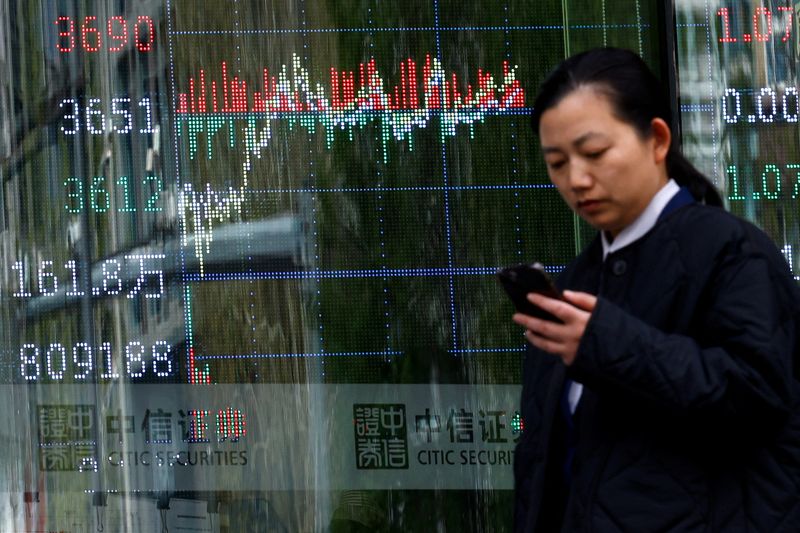×
Select Language
Financial news
Knowledge Hub
Asian stocks rise on signs of easing Sino-US trade tensions
2025-05-02 10:30:54

By Ankur Banerjee
SINGAPORE (Reuters) - Asian stock markets and U.S. futures rose on Friday as signs of possible trade talks between the U.S. and China lifted risk sentiment after lacklustre earnings from tech bellwethers Apple (NASDAQ:AAPL) and Amazon (NASDAQ:AMZN) fuelled worries about the impact of tariffs.
China’s commerce ministry said on Friday the United States has repeatedly expressed its willingness to negotiate on tariffs and that Beijing’s door is open for talks.
The comments helped U.S. stock futures reverse course from earlier falls after Apple trimmed its share buyback program and warned tariffs could add about $900 million in costs this quarter.
Futures for S&P 500 rose 0.6% while those for Nasdaq were 0.3% higher. Japan’s Nikkei gained 1% on a weaker yen and Taiwan stocks surged 2%.
MSCI’s broadest index of Asia-Pacific shares outside Japan rose 0.4%.
"They’ve struck a cautious tone, demanding that the U.S. ’show sincerity’ if they want trade talks," said Matt Simpson, senior market analyst at City Index.
"So while olive branch has been offered, you can hardly say China has ’come crawling’ like Trump had hoped."
Still, investor sentiment turned up on the comments as markets continue to grapple with President Donald Trump’s erratic tariff policies that have sparked fears of a sharp global economic downturn.
Data this week showed the U.S. economy shrank for the first time in three years in the first quarter, while China’s factory activity contracted at the fastest pace in 16 months in April.
Joseph Capurso, head of international and sustainable economics at Commonwealth Bank of Australia (OTC:CMWAY), said the main impact on the economy from tariffs will be felt when consumer prices rise.
"A recession will become likely if the price increases encourage consumers to cut spending and businesses to shrink workforces and cut capital spending. While a recession is not our baseline, it will be a close call this year."
The earnings season so far has underscored the cost of the rapidly shifting U.S. trade policy with many companies slashing or pulling their profit forecasts.
Still, while investors were disheartened by the earnings from Apple and Amazon, strong results from Microsoft (NASDAQ:MSFT) and Meta Platforms (NASDAQ:META) earlier in the week had raised hopes that the tech industry could weather the tariff storm.
In the currency markets, the Japanese yen weakened to its lowest level since April 10 on Friday, a day after Bank of Japan lowered growth forecasts due to U.S. tariffs and left interest rates on hold. It was last at 145.62 per dollar.
Fred Neumann, chief Asia economist at HSBC, said the impact of tariff uncertainty on the global economy could pose indirect challenges to growth in Japan.
"The BOJ is keeping the door open for further rate hikes, but at this point the door is only slightly ajar."
That left the U.S. dollar on course for its strongest weekly performance since the end of February ahead of the crucial non-farm payrolls data later in the day. The dollar index, which measures the U.S. currency against six other units, was last at 100.14. [FRX/]
Nonfarm payrolls likely increased by 130,000 jobs last month after rising by 228,000 in March, a Reuters survey of economists showed.
Japanese Finance Minister Katsunobu Kato said on Friday the country’s huge $1 trillion-plus in U.S. Treasury holdings are among the tools available for Tokyo to use in trade negotiations with the United States.
The remark came as Japan’s top trade negotiator Ryosei Akazawa met with U.S. Treasury Secretary Scott Bessent in Washington for a second round of bilateral tariff talks.
In commodities, gold prices eased to $3,234.9 per ounce, on course for its weakest weekly performance in two months due to slowing safe-haven demand.
Oil prices jumped after Trump threatened secondary sanctions on Iran. Brent crude futures rose 0.56% while U.S. West Texas Intermediate crude futures gained 0.6%.

